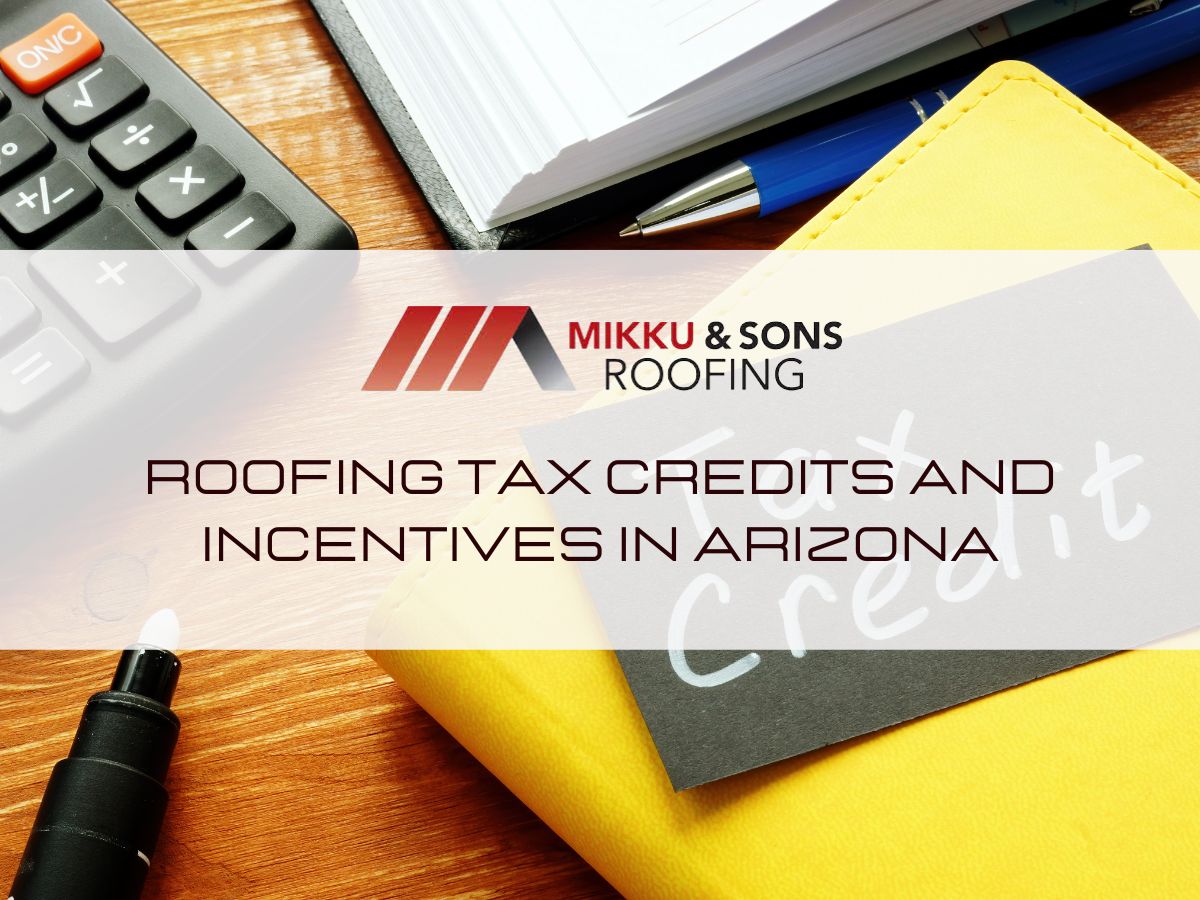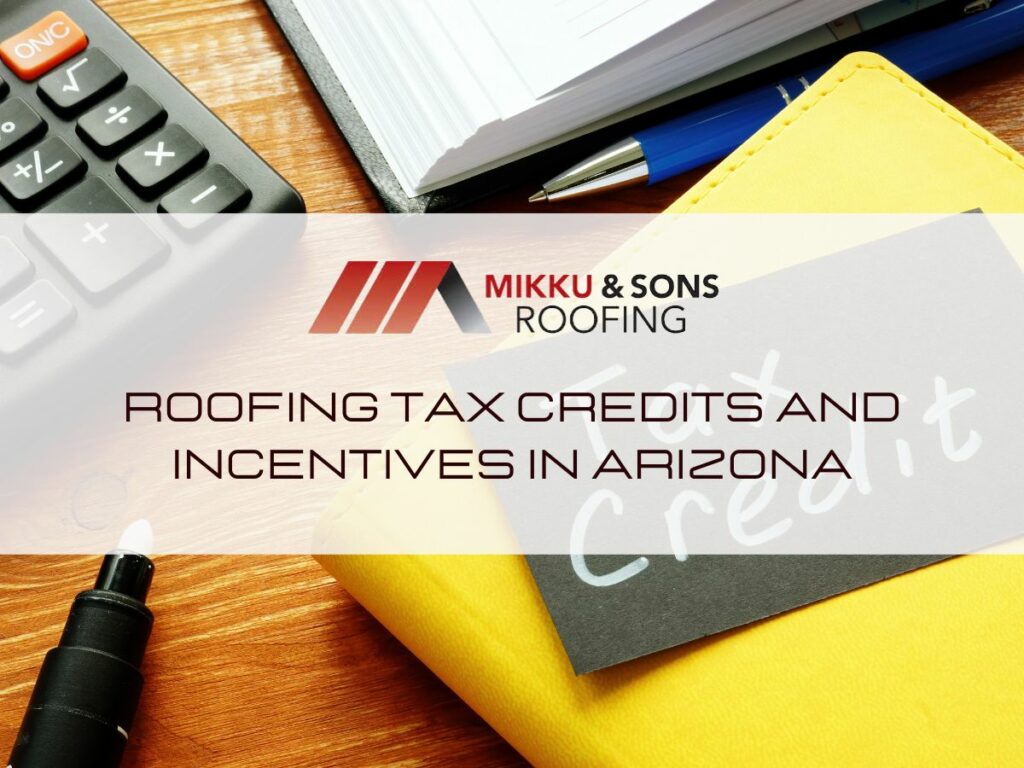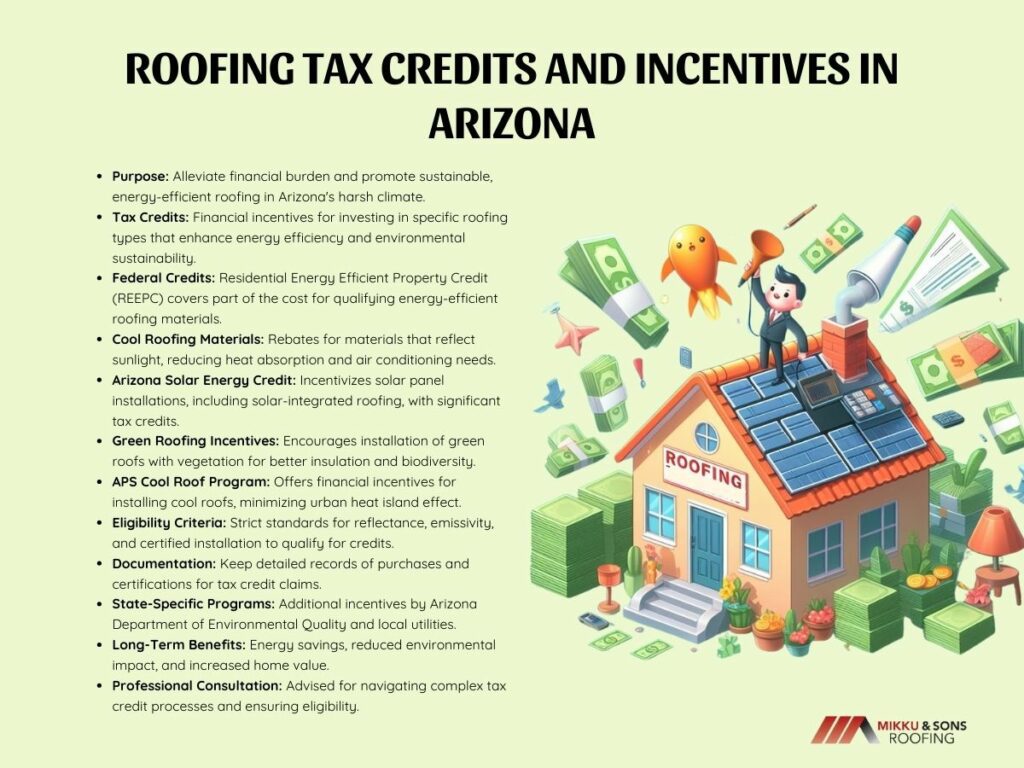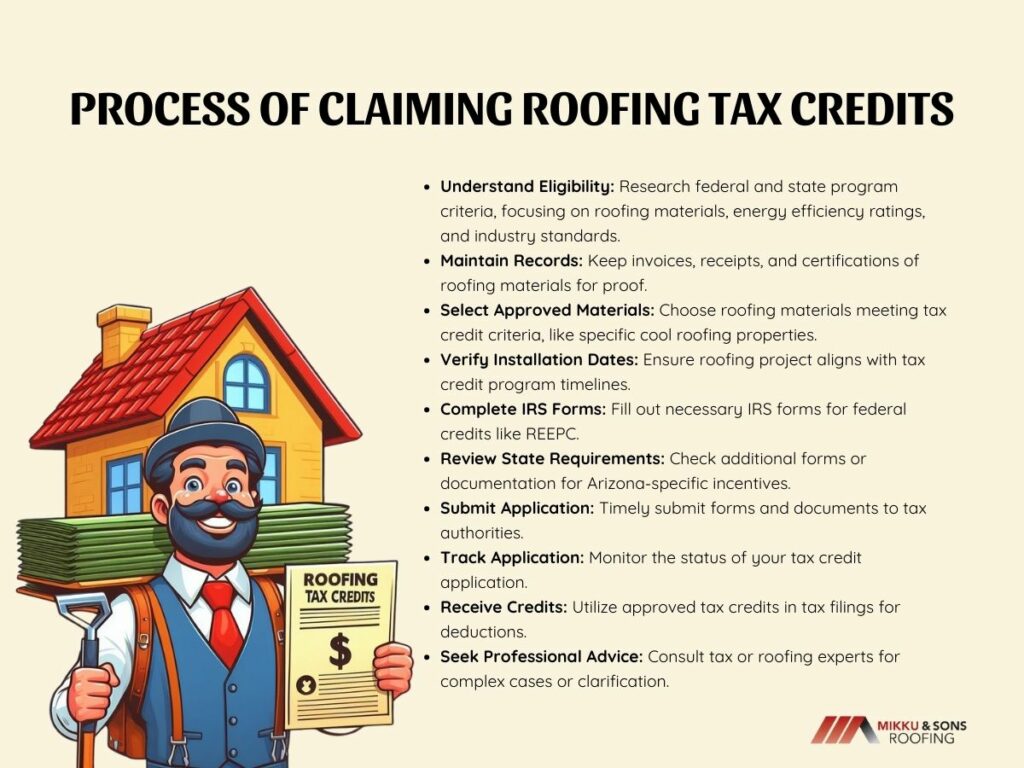

Arizona's climate poses unique challenges for homeowners, making the integrity of roofs a critical aspect of home maintenance. Whether it's the scorching heat of summer or occasional monsoons, a reliable roof is essential for protecting your home. However, investing in quality roofing materials and installations can be a significant expense for homeowners.
To alleviate this financial burden and promote sustainable choices, various tax credits and incentives are available in Arizona. Understanding these opportunities not only helps in reducing the overall cost of roofing projects but also encourages the adoption of environmentally friendly and energy-efficient solutions.

Roofing tax credits serve as financial incentives the government provides to encourage homeowners to invest in specific types of roofing materials or systems that contribute to energy efficiency, environmental sustainability, and overall home improvement. These credits are designed to benefit individual homeowners and contribute to broader goals of resource conservation and reduced environmental impact.
In essence, a tax credit allows homeowners to subtract a specified amount from their total tax liability, directly reducing the amount of taxes they owe. In roofing, these credits are often tied to installing energy-efficient roofing materials or systems that meet certain criteria outlined by federal and state governments.
It's important to note that tax credits differ from tax deductions. While deductions reduce the income subject to taxation, credits directly reduce the amount of taxes owed. This makes tax credits particularly advantageous, offering a dollar-for-dollar reduction in the homeowner's tax liability.
Understanding how these tax credits work is crucial for homeowners looking to make informed decisions about their roofing projects. Beyond the immediate financial benefits, investing in energy-efficient roofing can lead to long-term savings on energy bills, reduced environmental impact, and increased home value.

The federal government provides a range of tax credits aimed at promoting energy efficiency and sustainability in residential structures, including incentives specific to roofing. One notable program is the Residential Energy Efficient Property Credit (REEPC), which encompasses various energy-efficient improvements, including qualifying roofing systems. Under this program, homeowners can receive a tax credit for a percentage of the cost of specific roofing materials and installations that meet established energy efficiency standards.
Eligibility for federal roofing tax credits often revolves around the use of materials with reflective properties or those designed to enhance the insulation of the home.
It's crucial for homeowners to be aware of the specific criteria outlined by the Internal Revenue Service (IRS) to ensure that their chosen roofing materials and installations qualify for the federal tax credits. These criteria may include performance standards, such as reflectance and emissivity levels, and the need for certification from recognized industry bodies.
Furthermore, the federal government periodically updates these programs, adjusting credit percentages and eligibility criteria. Staying informed about the latest changes is essential for homeowners planning roofing projects to maximize their financial benefits.
In addition to federal programs, Arizona offers its own set of incentives and initiatives to encourage homeowners to invest in roofing solutions that align with the state's goals of energy efficiency and sustainability. The Arizona Department of Environmental Quality (ADEQ) and local utility companies may provide various programs to support residents in adopting environmentally friendly roofing practices.
The APS Cool Roof Program, spearheaded by the Arizona Public Service, is a cornerstone initiative aimed at fostering energy efficiency. This program provides financial incentives and rebates to homeowners who choose cool roofing materials.
Cool roofs are designed to reflect sunlight, preventing the absorption of heat and reducing the demand for air conditioning. This not only translates to energy savings but also contributes to a more sustainable urban environment by mitigating the urban heat island effect.
Homeowners benefit from the APS Cool Roof Program through reduced energy costs. Cool roofing materials contribute to lower indoor temperatures, reducing the need for air conditioning during hot Arizona summers. The financial incentives and rebates provided by the program ease the upfront costs of installing these energy-efficient roofing materials.
Eligibility for the APS Cool Roof Program typically requires the installation of specific cool roofing materials that meet established reflectance and emissivity standards. Additionally, the program may mandate certification from recognized industry bodies to ensure compliance with performance criteria. Homeowners are encouraged to consult program guidelines and work with roofing professionals familiar with cool roofing technologies to meet these eligibility requirements.
Geared towards advancing solar energy adoption, the Arizona Residential Solar Energy Credit incentivizes homeowners who invest in solar installations, including those integrated into roofing structures. This credit allows homeowners to offset a portion of the costs associated with installing solar panels, promoting the use of renewable energy sources.
Beyond immediate financial benefits, homeowners contribute to the state's broader goals of reducing reliance on conventional energy sources and promoting a cleaner, more sustainable energy grid. Homeowners can receive a tax credit equal to up to 30% of the total cost of their rooftop solar system under the federal solar investment tax credit (ITC).
Homeowners investing in solar roofing systems benefit from reduced dependence on conventional energy sources, leading to lower electricity bills over time. The Arizona Residential Solar Energy Credit provides a financial offset, making solar installations more accessible and financially viable for homeowners interested in adopting renewable energy solutions.
To qualify for the Arizona Residential Solar Energy Credit, homeowners must invest in solar systems, including solar panels integrated into roofing structures. The eligibility criteria often include using certified solar equipment and complying with installation standards. Verification of these criteria may involve submitting documentation such as invoices, receipts, and certification from reputable solar energy providers.
Arizona's commitment to energy efficiency extends beyond traditional roofing materials, encompassing a broader spectrum that includes incentives for green roofing solutions. Green roofing, characterized by the use of living vegetation and specialized growing medium, offers a range of environmental benefits, such as improved insulation, stormwater management, and biodiversity promotion.
In the state's pursuit of sustainability, homeowners engaging in green roofing projects may find support through various incentives. Some municipalities within Arizona have introduced programs that provide financial incentives or rebates for the installation of green roofs. These initiatives aim to promote ecologically friendly practices and contribute to the overall environmental resilience of urban areas.
Additionally, energy-efficient roofing materials that go beyond traditional asphalt shingles or standard metal roofs are often incentivized. Cool roofing materials, designed to reflect more sunlight and absorb less heat, can contribute to lower energy consumption by reducing the need for air conditioning. Arizona's arid climate makes the adoption of such materials particularly impactful in mitigating the urban heat island effect.
Claiming roofing tax credits involves a structured process that requires careful attention to detail to ensure eligibility and compliance with the stipulated requirements. Here's a step-by-step guide to help homeowners navigate the process:

An avenue toward cost savings and environmental conservation is revealed by investigating roofing tax credits and incentives in Arizona's sun-drenched landscapes, where the need for durable and energy-efficient roofing solutions is critical.
With their newfound understanding of these incentives, homeowners are better equipped to combine methods for optimal effect. Every choice you make, whether it's to install solar roofing systems or energy-efficient cool roofing materials, results in lower costs and a smaller carbon footprint. It's important to look into another option in order to strengthen the environmentally friendly strategy: solar roofing. Our related blog, "The 12 Advantages of Solar Roofing in Arizona," reveals the numerous advantages that come with incorporating solar technology into roofing systems.
